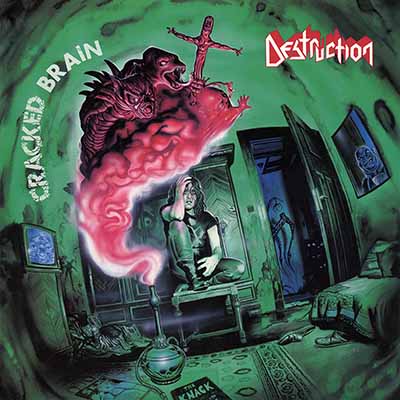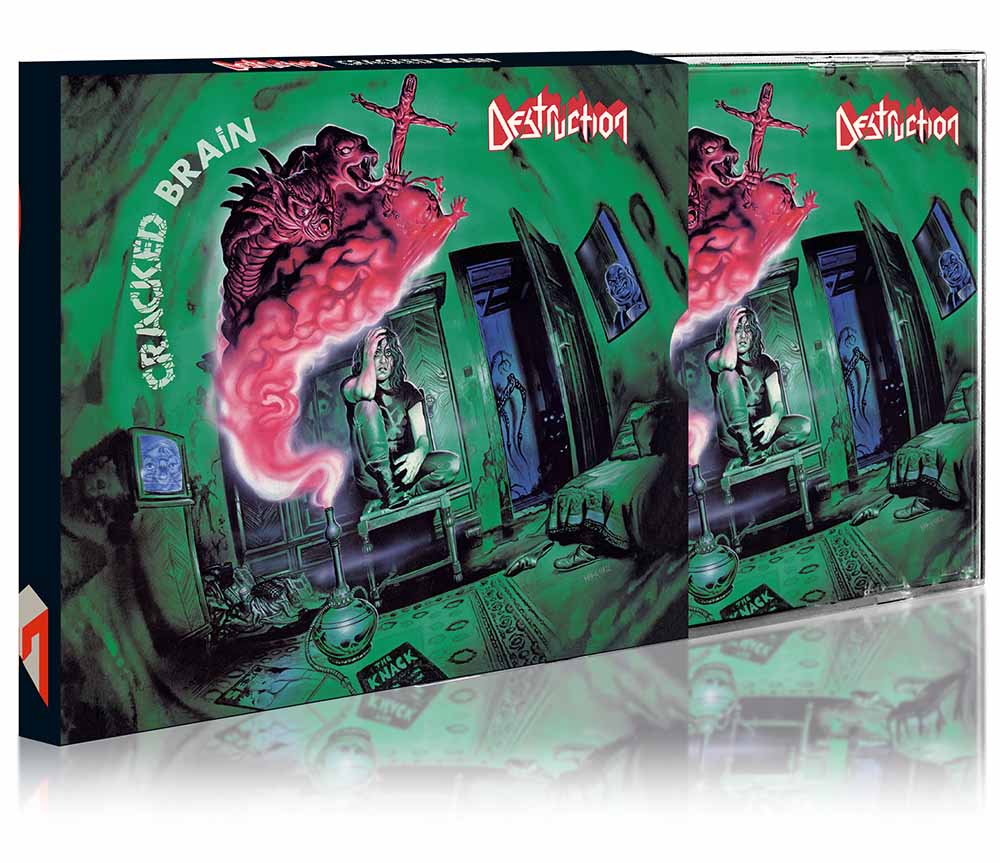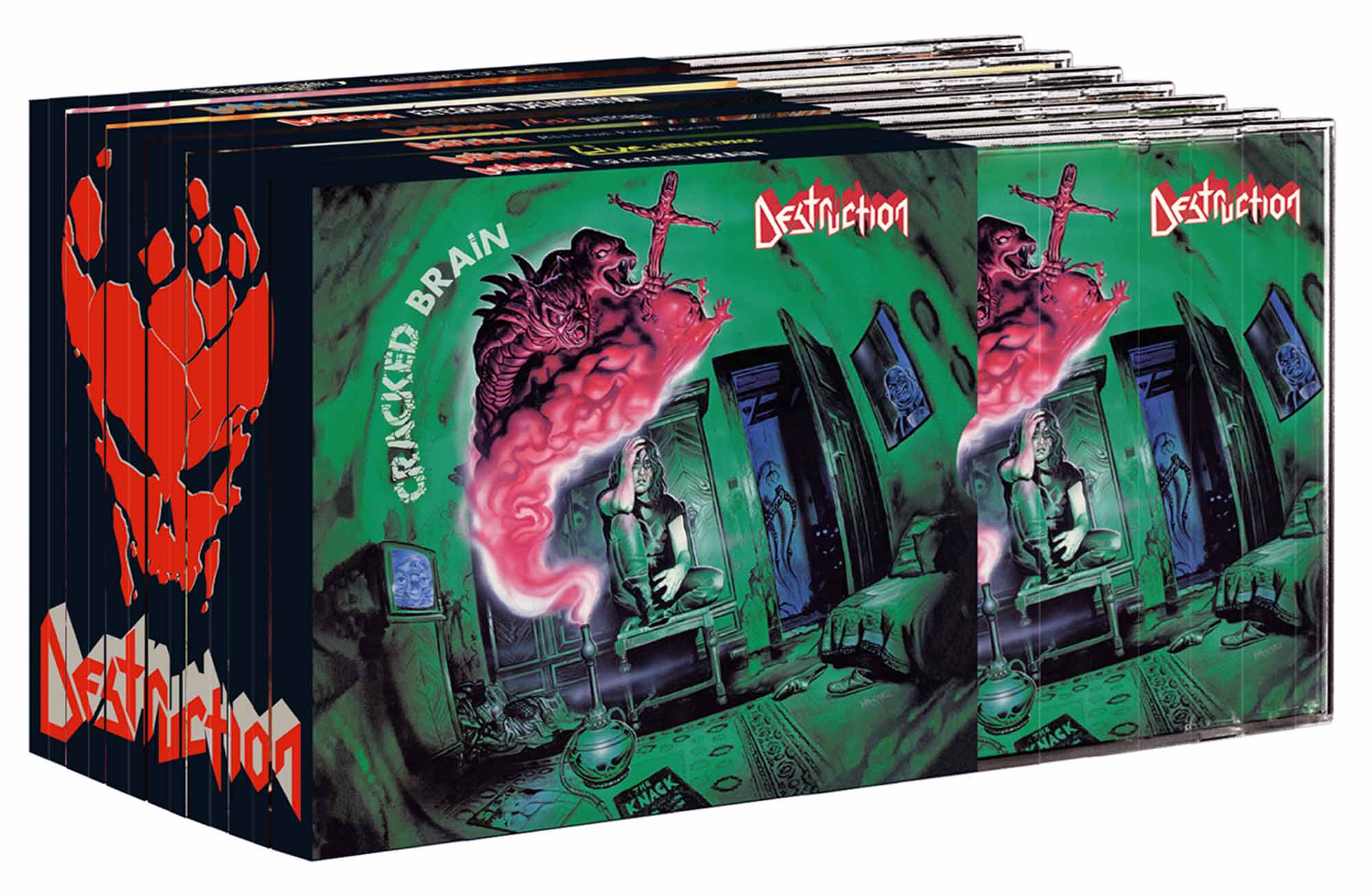 | ||||
| DESTRUCTION - Cracked Brain CD | |
HRR 552 CD, slipcase, poster | |
| André Grieder- Vocals Mike Sifringer - Guitars Harry Wilkens - Guitars Oliver Kaiser - Drums | |
| 1. Cracked Brain 2. Frustrated 3. S E D 4. Time Must End 5. My Sharona (The Knack cover) 6. Rippin' You Off Blind 7. Die a Day Before You're Born 8. No Need to Justify 9. When Your Mind Was Free | |
AVAILABLE | |
Remastered by V.O. Pulver at Little Creek Studio
“Cracked Brain” from 1990 and the eponymous single from the same year mark the beginning of a new period for Destruction – it was the first album not to feature Schmier and his distinctive vocals. Guitarist Mike Sifringer gives a short account on why the band fired him and on what terms they were afterwards: “We recorded the basic tracks – drums and riff-guitars – at Union-Studios in Munich, a very expensive place. But Schmier was not happy with the music anymore, so what to do? We had to stop the recording session and went back home, everybody was pissed. In hindsight I know we made a wrong decision, we didn’t talk enough. We did not meet for years after the split.”
History says the band broke apart after a tour with Celtic Frost in 1989. Is that true, and if so, do they want to talk about what happened on that tour that led to the decision? Former drummer Oli is willing to give some insights into that delicate matter: “The ill-fated package was put together by Noise Records who signed us up for England and the US. Celtic Frost were in their Cold-Lake-hairdo phase which meant metal fans largely boycotted their shows, and CF did suck then. We felt displaced and were glad when it was over. But apart from that we actually had a good time together…” Alright, looks like history has to be rewritten in that case.
Apparently, fans hadn’t been too pleased with the development Destruction had gone through on the previous record. “Cracked Brain” on the other hand was received with great delight by the (leading) press, who praised the album for the great song material, the brutal and precise execution of the music and the professional and mature impression of the whole thing. But Destruction never really gave to much about other people's opinion, says Mike: “When I compose a tune, I never think about anything like that. All I wanna do is write a good song, that’s it.” How had their approach to writing music changed, compared to what Destruction had been doing on “Release from Agony”? Mike: “I always thought that the song material on 'Cracked Brain' was a little less complicated then the stuff on 'Release from Agony', I don’t know. It still was not straight enough for Schmier, too bad.”
Mike gives some insights into the recording process: “To save a bit of money we recorded bass and vocals in Berlin at Sky Track. A funny bloke named Gerdy, that’s all I remember, was behind the desk there. Finally, the producer Guy Bidmead, Oli, Harry and I mixed the whole thing back in Munich.”
Schmier had been replaced by André Grieder from the Swiss thrash metal outfit Poltergeist. No doubt that André was fit for the job, but why exactly had he been the replacement of choice? Oli explains: “André had been a long-time friend of ours – and still is. We asked him if he would like to finish 'Cracked Brain' with us because we liked his melodious approach to thrash, his style was a bit Testament-influenced you might say. We knew there would never be another Schmier so we thought it’d be better to go into a different direction with the vocals. André really did a great job on 'Cracked Brain'.” Albeit a great vocalist, André did not have too much of an influence on the creative process: “When André flew up to Berlin for the recording sessions, I had everything already laid out for him. I sang the songs to him and he nailed them just like that.”
The stunning cover image for ”Cracked Brain” was contributed by Andreas Marschall who already created the cover artwork for “Live without Sense”. Oli: “We sent him a big wish list with how we thought the cover could look like. We were blown away by what he came up with.”
The early nineties were a time when many other thrash bands started experimenting with new influences, what in many cases led to a complete disaster. Was it a conscious choice not to go down that road with “Cracked Brain”? Mike has a strong opinion on that: “The early nineties sucked in general!!! That techno-bullshit was all over the place and people blew their minds with Ecstasy. We tried to ignore all this crap and just did our thing.”
What role does the album play in the history of Destruction – it is counted as the last of the “classic” Destruction phase and the only full-length without Schmier that still is part of the official discography, right? And apart from that? Oli: “Once and for all the album clearly showed us that Schmier and Destruction are synonymous. There should have never been an album without him. And as much as I like the album with André’s vocals, it would have been a huge smash with Schmier on it, no doubt.”
Whose idea was it to include that version of “My Sharona”, originally performed by The Knack, and how where the reactions to this cover song? Mike: “If I remember right, it was Oli’s and mine. Schmier didn’t like the idea at all, he hated it…” Oli: “…and he was right, haha!” Mike: “The reactions were varied, from shit to great. Some people found it too 'rockish' and not fitting our style, some found it interesting and cool.”
With SED (Socialists’ Eternal Death) there is a song on “Cracked Brain” that openly deals with and criticises the leading class of the GDR, which was in the process of dissolving and about to be reunited with Western Germany. Why was it important to have a song like this on the record, and how did the band experience the fall of the Berlin Wall and the German reunification? Oli explains it all: “Back then, there was a general feeling that the fall of the Berlin Wall would drastically change political balance not only in Germany but also on a global scale, which of course it did soon enough. We didn’t support that hasty reunification, it seemed like the German Chancellor Kohl was simply grabbing the limelight, and in fact, it became an unprecedented example of economic mismanagement. Nevertheless Kohl has always been praised for it, even more so after his death. The pace at which the reunification took place was simply wrong. Although GDR politics were a disgrace to the original idea of socialism – no better than the inhuman Chinese counterpart – we thought that some 'social' aspects of socialism should and could be saved, and now was the time. The chance was missed and all dissolved in the promises of fatal Western capitalism.”
After all this serious stuff, let's get back to the album itself for a very last question: What is it Oli and Mike like best about “Cracked Brain” and what is it they like least? Mike: “It was not easy to finish this album after all these problems. But we did our best to get it done and the result is quite respectable, for my taste. I hate that we split up, that’s for sure.”
Oli: “I love the guitars on this album, Mike and Harry were at an all-time peak…” True. And now there is a good chance that they'll finally get all the praise they deserve.
Ulrike Schmitz

